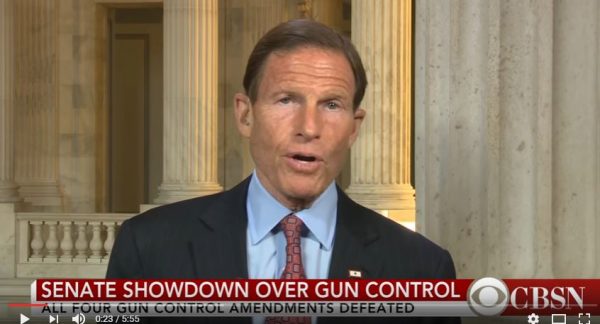
Tuesday’s temporary restraining order issued by federal Judge Robert Lasnik in Seattle may have blocked “official” publication of 3-D gun design technology, but it hasn’t prevented gun prohibitionists from engaging in hysteria about so-called “ghost guns.”
This all stems from a settlement between the Justice Department and Defense Distributed, whose founder, Cody Wilson, wants to post 3-D technology codes for creating a gun, or firearm components. His lawsuit against the government dates back three years and was supported by the Second Amendment Foundation.
Anti-gun Sen. Richard Blumenthal’s remarks during a press event is now being ridiculed across social media for its factually challenged content.
Holding up images of two AR-15 type rifles, Blumenthal, a Democrat, declared, “Coming to a theater near you. Coming to a school near you, coming to a sports stadium, to any public place. These ghost guns are the new waved of American gun violence. You will see them around our streets, in our airports, our train stations. They are undetectable, untraceable—forget about the TSA guarding the plane that you board. These ghost guns are a menace. The failure to ban them will mean blood on the hands of officials who have that responsibility.”
The National Rifle Association’s Chris Cox, executive director of the Institute for Legislative Action, was quick to respond to such rhetoric.
“Many anti-gun politicians and members of the media have wrongly claimed that 3-D printing technology will allow for the production and widespread proliferation of undetectable plastic firearms,” Cox said. “Regardless of what a person may be able to publish on the Internet, undetectable plastic guns have been illegal for 30 years. Federal law passed in 1988, crafted with the NRA’s support, makes it unlawful to manufacture, import, sell, ship, deliver, possess, transfer, or receive an undetectable firearm.”
Seattle Mayor Jenny Durkan, a former federal prosecutor, should know about the 1988 federal law. Instead, she told reporters, “I know untraceable and unregulated 3D printed guns present a real danger to the residents of Seattle…Because of Attorney General (Bob) Ferguson’s lawsuit, a federal judge has put this administration’s dangerous plan on hold and has taken a responsible step to protect law enforcement, public safety and our national security.”
Ferguson also issued a statement, quoted in the Seattle Times, “I am thankful and relieved Judge Lasnik put a nationwide stop to the Trump Administration’s dangerous decision to allow downloadable, 3D-printed ghost guns to be distributed online. These ghost guns are untraceable, virtually undetectable and, without today’s victory, available to any felon, domestic abuser or terrorist.”
In Seattle, KIRO Radio’s Dori Monson took Ferguson to task for the 3-D lawsuit at MyNorthwest.com, calling it another effort by the Democrat attorney general to get media attention in a widely anticipated run for governor in 2020.
The temporary restraining order issued by Lasnik, a Bill Clinton appointee, may have been too little too late. According to NBC News, a “coalition of gun rights advocates” published “similar blueprints” on line, arguing that they were protected by the First Amendment.
And they might very well be. Lasnik has scheduled another hearing on Aug. 10. This does not appear to be over, yet.